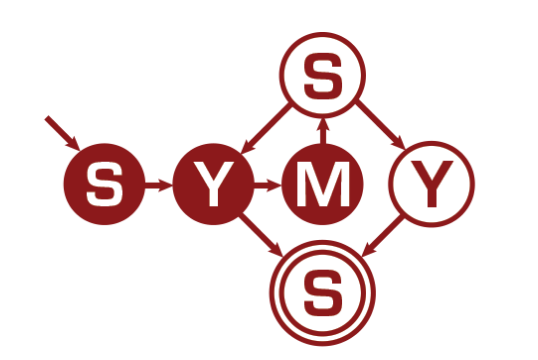Humans of SymSys: Hope Schroeder
/"I wanted a major that would address [these] questions, teach me to think in new ways, and also push me in terms of my technical skills. Bam!"
Hope is a junior majoring in Symbolic Systems with an Individually Designed Concentration.
Introduce yourself: I’m Hope! I like travel, skiing, ice skating, yoga, lakes, art, and VR.
What drew you to the SymSys major? Why did you pick SymSys as opposed to other (especially, related) majors?
Symbolic Systems was on my radar coming into Stanford, but as someone with eclectic interests, I tried a lot of things before deciding on SymSys. Along the way, I was continually drawn to the questions that SymSys forces us to consider. I wanted a major that would address these questions, teach me to think in new ways, and also push me in terms of my technical skills. Bam!
What’s your favorite SymSys-related class that you’ve taken so far?
Bio150 with Robert Sapolsky, to give an unoriginal answer. I recommend this class to SymSysters and non-SymSysters alike. It will make you think deeply about our bodies and minds as biological agents, and the degree to which biology affects how we interact with each other and our earth. It makes our philosophical discussions in SymSys seem even more pressing.
Fun fact-- Dr. Sapolsky played piano for the musicals I was in during elementary school because his kids went to my school. It was funny to get to Stanford and be utterly blown away by his deep expertise, command of the classroom, and skill at giving an engaging lecture. “Incredible individual” does not even begin to cover it.
Are you involved in research? If so, tell us about a project you are working on:
Yep, I’ve been working for the Clayman Institute for Gender Research since before I came to Stanford! Gender equality might not seem like a topic that meshes easily with SymSys, but over time, the overlap has emerged. I’ve done linguistic analysis of performance evaluations in tech companies to see how the language differs in describing the performance of men and women for a few years now. This year, Chris Potts is advising me in developing a computational tool to do a quantitative analysis of these evaluations to complement the qualitative work we usually do. It’s a perfect marriage of my interests, and SymSys allowed me to see a new way of studying this societal problem.
What is one piece of advice you'd like to offer to younger students?
When choosing how to spend your time at Stanford in the summer, think about what excites you. Are you applying for things because they’re what you’re supposed to want, or are they what you actually want? The world is huge and exciting, and Stanford has the resources to help you pursue your wildest dreams. Consider making those a reality! Get a grant for research (some even let you travel!), start something, or even take time off from Stanford if you need it, either on your own or in a study abroad program.
What underlying questions and issues do you hope to tackle/learn more about through SymSys?
One topic I’ve been thinking about is the general idea of abstraction versus instantiation. The models we make in SymSys are abstractions-- we abstract things that are experienced at the individual level into patterns. Minds, both virtual and real, are instantiations of abstractions. When we abstract experiences at scale, what is lost? How good of an abstracted model of experience can we hope to get? Where is the limit to what we can understand about human experience through patterns?
As a diverse major with a lot of flexibility, many students struggle to find continuity across their coursework. (How) do you address this?
Personally, I’ve never felt more continuity than I do now. I’m concurrently enrolled in Ling130A, CS124, and CS103. It’s exciting to feel like learning logic has paid off in every one of those classes. They’re all speaking the same language in different ways.
During some of my earlier quarters with class combinations like Math51 + Bio150 or CS106A + Psych50, it was harder to feel that continuity. Maybe if I had gotten involved in SymSys society earlier, I’d have felt more overlap in the conversations I’d have been able to have with my peers.
What’s the coolest (loosely) SymSys-related topic that you’re excited about right now?
I’ve been interested in virtual reality for a couple years now. We should be talking about it more in SymSys, because it’s changing how we talk about and integrate models of reality into our conception of what reality is.
Last year, David Chalmers gave a fascinating talk about the philosophy of VR, and it inspired me to think about VR and AI in a similar continuity as we think about minds systematically interacting with worlds in Symbolic Systems. Shouldn’t we be studying how virtual minds interact with virtual worlds as part of how we investigate how real and mechanical minds interact with real worlds?
Shameless plug: join Rabbit Hole VR if you’d like to learn more or get involved in VR and mixed reality at Stanford!
Hope is one of many profiles featuring selected alumni, undergraduates and graduates who are involved in the Symbolic Systems community.


